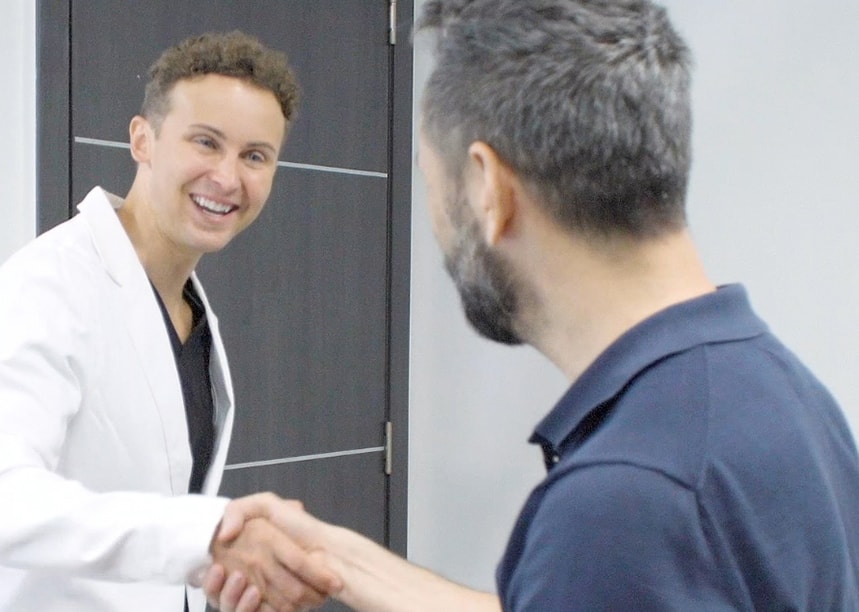Is My Low Back Pain a Sign I Should Seek Sciatica Pain Treatment near Me in West Orange?
July 13, 2021
Here Are 5 Things Our Doctors Want You to Know About Lumbar Radiculopathy
If it weren’t for our nervous system, our bodies would not be able to achieve that seamless communication between vital body organs in order to function the way it does now. So, if a nerve suddenly gets compressed or damaged, it is only natural to experience an unpleasant sensation. It can be a sharp, short-lasting type of pain that goes away in a few minutes, such as when you hit your elbow on a pointy surface, or it can last for multiple days and even require the doctor’s help to find the proper treatment for chronic pain.
A pinched nerve in the lower back – usually the sciatic nerve – is called lumbar radiculopathy. When this happens, your lower back might not be the only region affected. Your legs, hips, and feet might be affected as well.
The symptoms can be treated with over-the-counter medicine in most instances, but if what’s putting pressure on the nerve has a chronic root cause, it will take the expertise of a pain doctor to put a proper diagnosis and give advice on pain management.
If you suspect something may compress your sciatic nerve and are looking to find effective sciatica pain treatment near you in West Orange, then look no further than Pain Treatment Specialists. Our board-certified sciatica doctors work closely with every patient that visits our pain clinic and are here today to talk about a few important facts you should know about lumbar radiculopathy, to better understand your condition.

Fact #1: Patients can experience various symptoms
The most obvious sign of lumbar radiculopathy is a sharp, shooting pain that starts in the lower back. It usually happens all of a sudden, when too much pressure is put on a nerve or nerve root. Muscle spasms, weakness, and loss of reflexes can also be symptoms of lumbar radiculopathy.
While the pain does start in the lower back, it often extends to other regions of the lower body, including the hips, buttocks, legs, and feet. How and where these symptoms start to develop depends on the region of the nerve that was affected.
Fact #2: The cause can be chronic or acute
The change of having to deal with radiculopathy increases as an individual gets older – usually over the age of 30. This happens because, as we age, the vertebrae are pushed closer together and the discs start to degenerate, putting more pressure on the nerves around the spine.
Causes of lumbar radiculopathy include, but are not limited to:
- Herniated discs
- Trauma or injury to the back
- Mechanical stretching
- Osteophytes
- Spinal stenosis
- Spondylolisthesis
- Bone degeneration
- Rheumatoid arthritis
Herniated discs remain the most common cause of lumbar radiculopathy and sciatica. This condition occurs when the spongy cushions between your vertebrae degrade. As a result, they can rip, and thus nothing is left to protect the vertebrae from rubbing against each other. This rupture can often put pressure on the sciatic nerve, causing discomfort.
Fact #3: You may need to see a doctor for proper diagnosis
If you can’t find pain relief using at-home methods such as hot and cold therapy, anti-inflammatory medicine, muscle relaxants, and light stretches, it is time you call your pain doctor to schedule an appointment and receive a proper diagnosis.
To determine what is causing your lumbar radiculopathy, your sciatica doctor will start with a physical examination focused on the lower region of the spine. He or she will test if you experience balance problems, limited range of motion, muscle weakness, loss of reflexes, or changes in sensation.
If the physical exam is not sufficient for a correct diagnosis, your doctor may also recommend MRIs, CT scans, and other tests to further investigate your condition. The sooner you get diagnosed, the sooner you can begin treatment and get back to your pain-free life.
Fact #4: Thankfully, there are multiple treatment options
Once your sciatica doctor discovers what puts pressure on the nerve, he or she will begin by telling you about the various treatment methods available. The most appropriate one should be decided by you and your doctor, but here’s what to expect in terms of available lumbar radiculopathy treatments:
- Nonsteroidal anti-inflammatory drugs – medication may help reduce inflammation and lower pain levels
- Physical therapy – a physical therapist will help you develop an exercising routine meant to strengthen the core and make the recovery process smoother
- Lifestyle changes – these include adjusting your sleeping position, keeping an eye on your posture, regular exercise, as well as rest when necessary
- Minimally invasive procedures – epidural steroid injections are among the most effective methods to treat a pinched nerve
- Surgery – although it rarely happens, surgery is used as a last resort for pain specialists, if no other method of treatment succeeds
Fact #5: Stretches can help your condition as well
Sedentarism is one of the main causes of disc degeneration and herniation, so if you want to prevent your vertebrae from damaging your sciatic nerve, you need to stay active. Light stretches will help not only with recovery but also prevent the issue from happening again.
Discuss with your doctor to ensure none of the exercises in your routine can actually worsen your condition and use a yoga mat for extra back comfort. The following stretches are usually back-pain-friendly and should not cause additional pain:
- Knee-to-chest stretches: lie on the back, with your head slightly elevated using a small pillow. Bend both knees and keep your feet on the floor. Bring each knee up to your chest, one at a time, and hold it for about 30 seconds. Repeat three times with each leg.
- Mobilizing stretches: lie on the floor, but this time, instead of bringing your knees to the chest, lift your legs up towards the floor, without pointing your toes. Hold for 30 seconds for each leg and repeat three times with each leg.
Whether it’s for your back, leg, or neck pain, if you are looking for effective treatment in West Orange, NJ, Pain Treatment Specialist is the right choice. Our team of Harvard-trained sciatica doctors will work closely with you to ensure you receive the best possible treatment option available and to have a pain free life. Schedule an appointment at our West Orange, NJ Pain Center near the Essex Country Club today or at any of our conveniently-placed New Jersey and New York clinics!
Book a Consultation
Scheduling a consultation with one of our pain treatment specialists is one of the best ways to determine the proper solution for pain relief.
Meet Our Team of Back Pain Specialists
All of our Pain Doctors in New Jersey are Harvard Trained and Board Certified in Pain Management

Back Pain Doctor Clifton & West Orange NJ
Dr. George Hanna
Dr. Hanna is a Harvard Trained back specialist in New Jersey and New York. He serves as Medical Director of Pain Management.

Back Pain Doctor Clifton & West Orange NJ
Dr. Laura Lombardi
Dr. Lombardi is a Harvard Trained back pain treatment doctor, currently seeing patients in Clifton and West Orange, New Jersey.

Back Pain Doctor Clifton & West Orange NJ
Dr. Shane Volney
Dr. Volney is a Harvard Trained back treatment doctor seeing patients in the NJ areas of Clifton & West Orange, and in NYC.

Back Pain Doctor Clifton & West Orange NJ
Dr. Michael Nguyen
Dr. Nguyen is Harvard Trained and Board Certified in Pain Management. His pain center accepts major medical insurances and Medicare.

Dr. George Hanna

Dr. Laura Lombardi
Dr. Lombardi is a Harvard Trained back pain treatment doctor, currently seeing patients in Clifton and West Orange, and Paramus New Jersey.

Dr. Shane Volney
Dr. Volney is a Harvard Trained back treatment doctor seeing patients in the NJ areas of Clifton & West Orange, and in NYC.

Dr. Michael Nguyen
Dr. Nguyen is Harvard Trained and Board Certified in Pain Management. His pain center accepts major medical insurances and Medicare.
